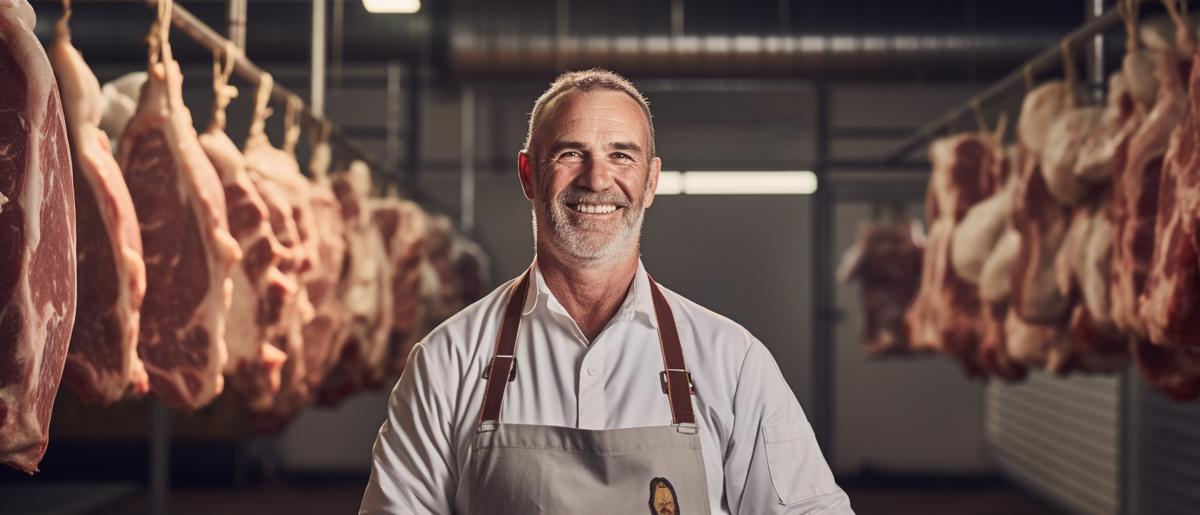

In the bustling world of Australian Meat Wholesalers, many moving parts contribute to maintaining a thriving business. Among them, financing plays a pivotal role. The costs attached to purchasing high-quality meat, storage facilities, and necessary equipment are considerable. Failure to adequately fund these aspects can hamper day-to-day operations, affecting revenue streams significantly. Hence, business loans surface as a financial lifeline, offering the necessary capital for smooth operations and business expansion. Whether it’s enhancing the storage facility, acquiring cutting-edge technology, or buying high-quality meat in large quantities, a business loan can equip Meat Wholesalers with the financial muscle they need. As the business landscape evolves, so do the needs of Meat Wholesalers. Timely financial injections via business loans can prove essential for long-term success, even in times of uncertainty. Building a grounded and prosperous meat wholesale business in Australia, therefore, often rests on pivotal business decisions, among which, securing a well-suited business loan can be significant.
Compare over 50+ lenders with one application.
Meat Wholesalers play an indispensable role in the Australian economy and the food supply chain. As vital intermediaries, they bridge the gap between slaughterhouses and retailers, thereby ensuring that quality meat products reach consumers across the nation seamlessly. Australia, being a country with a rich tradition of meat consumption and a thriving livestock industry, relies significantly on Meat Wholesalers. They're responsible for the procurement, storing, and distribution of a varied range of meat products – beef, lamb, mutton, poultry, pork, and more. Moreover, their operations support Australia's agricultural sector, providing crucial market pathways for farmers and contributing to rural economies. Beyond supply chain facilitation, their importance extends to quality assurance and food safety. Adhering to stringent health standards, they ensure the meat complies with sanitary and safety guidelines, thus protecting consumer health. Additionally, Meat Wholesalers support employment in the country. From warehousing and transport to sales and administration, their businesses create diverse job opportunities, reinforcing local economies. In the face of rising consumer expectations and increasing demand, Meat Wholesalers are continually upgrading their facilities, improving logistics, and adopting the latest technology – all these necessitate significant financial commitments. Therefore, they often tap into various forms of business loans tailored to their specific needs and business cycles. Thus, acknowledging the importance of Meat Wholesalers in Australia opens up conversations about their financial needs and the support they seek in sustaining the pivotal role they play in Australia's food landscape.
Learn about eligibility and how to apply.
Australia's meat wholesalers operate within a complex and swiftly transforming commercial landscape. Navigating these industries can pose a range of significant challenges, each potentially impacting the stability and profitability of businesses in the sector. One of the primary challenges in this sector is the high operational costs. Meat wholesalers must often invest heavily in equipment, storage facilities, and refrigeration systems to ensure that meat products remain fresh and safe for consumption. The cost of maintaining stringent hygiene standards and meeting regulatory requirements can form a substantial part of their operating expenses. The unpredictability of the market poses another critical challenge. The price of livestock can fluctuate dramatically due to factors such as changes in weather patterns, supply chain disruptions, and shifting consumer preferences. These unpredictable swings can significantly impact wholesalers’ profit margins and could result in substantial financial losses. Lastly, a key challenge involves managing risk in supply chains. The meat industry relies on an intricate system of transport and storage facilities. Any disruption in this chain, caused by weather events, infrastructural failures, or unforeseen global events such as the COVID-19 pandemic, can result in significant losses both in inventory and potential sales. Each of these challenges emphasises the importance of consistent cash flow and available capital. They underline why many meat wholesalers might seek financial solutions like business loans to support their operations and future growth. With the right financial backing, these businesses can more confidently navigate their way through these industry challenges, ensuring a thriving and resilient meat wholesale industry in Australia.
Calculate your repayment estimates and more.
A business loan can serve as a crucial lifeline for meat wholesalers, often addressing the industry-specific challenges they experience. With cash flow often being unpredictable due to seasonal demand variations and market volatility, accessing external funding can immediately bolster a company's finances. This financial injection can lessen the impact of periods where costs overshoot revenue, ensuring smoother operation. The competitive nature of the meat wholesaling industry prompts businesses to keep up with modern commercial trends and technologies. A business loan can assist in this regard by providing the necessary capital to invest in up-to-date processing and packaging equipment or utilise software that improves efficiency and reduces wastage. The ability to adapt quickly to industry advancements can significantly improve a wholesaler's market standing. Lastly, a business loan for meat wholesalers can offer a firm foundation to capitalise on growth opportunities when they arise. Whether it's expanding existing premises, investing in a larger fleet of delivery vehicles, or branching out into new markets, having the necessary capital in advance can often be the difference between seizing the moment or watching a golden opportunity pass by. Thus, although not without its caveats, a business loan can indeed provide a meaningful solution to the challenges faced by meat wholesalers.
Meat wholesalers in Australia can access a variety of business loans. Some prefer short-term loans for immediate needs, while others lean towards equipment finance for upgrading machinery. However, those looking to expand might opt for a long-term business loan. These loans provide the financial support needed to grow and succeed.
There are several types of business loans in Australia that can benefit Meat Wholesalers. Each of these loan types has its unique features, advantages, and potential disadvantages. Here are some of the most common types of business loans for Meat Wholesalers:
Term Loans
Term loans are a traditional form of business finance suitable for meat wholesalers. They come with a set term and repayment structure, allowing businesses to plan their finances efficiently.
Bridging Loans
Bridging loans can help meat wholesalers manage their cash flow during periods of disruption. They are designed to be repaid within a short-time frame, providing temporary financial relief.
Equipment Finance
Whether it's a new refrigeration system, a fleet of delivery trucks, or a state-of-the-art meat processing facility, equipment finance can help meat wholesalers procure the necessary assets for their business operations.
Invoice Factoring
For meat wholesalers dealing with late payments, invoice factoring provides an option to sell their outstanding invoices to a financial institution for immediate cash, helping to maintain steady cash flow.
Inventory Loans
Inventory loans are a type of short-term borrowing specifically used to purchase inventory. They are particularly useful for meat wholesalers in the run-up to peak sales periods.
Line of Credit
If a meat wholesaler needs flexible, ongoing access to funds for any reason, a business line of credit might be the ideal lending instrument. It works much like a credit card, only with much higher borrowing limits.
Commercial Property Loans
These loans are especially relevant for meat wholesalers looking to purchase, expand, or refurbish commercial premises such as storage facilities or processing plants.
Overdrafts
Business overdrafts can be linked to your business account, providing an emergency safety net when cash flow is tight.
Merchant Cash Advances
A Merchant Cash Advance (MCA) provides a cash advance against future sales. This can prove beneficial for meat wholesalers experiencing seasonal fluctuations in revenue.
Trade Finance
Trade finance helps meat wholesalers manage their international transactions, ensuring smooth operation when dealing with overseas suppliers or buyers. This can include letters of credit or other types of funding and risk mitigation.
Business loans offer Meat Wholesalers in Australia resources to continue business growth. Common uses include investing in more inventory, acquiring state-of-the-art machinery, undertaking renovations to warehouses, or hiring additional skilled staff. The flexibility of these loans supports wholesalers to address their specific business needs.
Here are some common reasons Meat Wholesalers use business loans:
Inventory Expansion
Taking a business loan allows meat wholesalers to increase their inventory. By having more variety and stock of meats, wholesalers can meet the diverse demands of their customers and potentially expand their client base.
Advanced Machinery Purchase
Modern machinery and equipment can enhance efficiency in meat processing and packaging. Business loans can be utilised for procuring advanced machinery, thus improving operations and product quality.
Facility Upgrade
Wholesalers may need to upgrade their storage facilities to keep products fresh and meet health safety standards. A business loan can cover these costs without impacting the cash flow.
Training and Education
Investing in employee training contributes to improving business efficiency. Offering training courses and workshops related to equipment handling, hygiene, product knowledge and customer service can help wholesalers build a skilful team.
Insurance Costs
In the meat wholesale industry, investing in comprehensive insurance is crucial. A business loan can help meet the expenses of different types of insurances encompassing product, workers’ compensation and public liability insurance.
Marketing and Advertising
To reach out to a larger audience base, constant marketing and advertising are essential. A business loan can be used to launch online or offline ad campaigns, redesign the company’s website, or invest in SEO.
Digital Transformation
Much like other businesses, meat wholesalers can also leverage digital transformation for better business management. Implementing a robust ERP system or delivery scheduling software could improve operational efficiency.
Business Expansion
If a wholesaler decides to expand their business geographically or diversify their product range, a business loan can provide the necessary financial support.
Cash Flow Management
During slower business periods, maintaining cash flow can be a challenge for wholesalers. A business loan can act as a financial safety net during these times, covering operational expenses.
Emergency Funds
Unexpected situations like equipment breakdown or sudden changes in prices can severely affect business operations. Having a business loan can provide a ready solution in such instances, ensuring the business runs smoothly.
To estimate your monthly repayments and the total cost of the loan, input the loan amount, loan term and interest rate into the calculator below. This helps you plan your budget and choose the most suitable loan terms.
These helpful FAQs will help you find the answers you need. If you can't find what you're looking for, you can request a callback below.